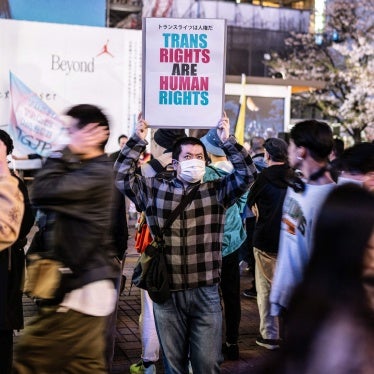(New York) - Criminal convictions in Fiji of two men for homosexual conduct violate international human rights principles and the country’s own constitution, Human Rights Watch said today. On April 5, a Fijian court sentenced an Australian and a Fijian to two years in prison for offences “against the order of nature” and “gross indecency.”
Thomas Maxwell McCoskar, a 55-year-old Australian, and Dhirendra Nandan, a 23-year-old Fijian, had allegedly had sex and taken nude pictures of one another in an apartment in the town of Nadi between March 24 and April 3. Human Rights Watch urged the Fijian government to drop the charges against the two men and order their release from prison immediately.
In 1997, Fiji joined South Africa as one of the first countries in the world to enshrine protections against sexual-orientation-based discrimination in its constitution.
“Fiji should respect its own constitutional ban on discrimination against gays and lesbians,” said Scott Long, director of Human Rights Watch’s Lesbian, Gay, Bisexual, and Transgender Rights Project. “These harsh sentences are a reminder that Fiji must repeal its colonial-era sodomy laws, which threaten individuals’ dignity, equality and privacy.”
The judge in the case, Syed Mokhtar Shah, reportedly called the men’s acts “something so disgusting that it would make any decent person vomit.”
Article 175 of Fiji’s Penal Code provides for up to 14 years’ imprisonment, “with or without corporal punishment,” for “any person who has carnal knowledge of any person against the order of nature.” Article 177 allows up to five years’ imprisonment for “any male person who, whether in public or private, commits any act of gross indecency with another male person.” Both are borrowed from Victorian-era British laws against homosexual conduct. Fiji was a British colony from 1874 until independence in 1970.
These penal laws are contrary to Fiji’s 1997 constitution. Article 38 of the constitution bars discrimination based on any “actual or supposed personal characteristics or circumstances, including…sexual orientation.” Article 37 of the constitution also protects the “right to personal privacy.”
The 1997 constitution has been controversial in the ethnically divided country since its passage, both because of its protections for sexual orientation and because it granted equal political rights to Fiji’s Indian population.
Existing legislation has never been revised to implement or conform with the sexual-orientation article. In 1999 and 2000, the Methodist Church—the dominant denomination among largely Christian ethnic Fijians—pressed strongly for Parliament to amend the constitution and remove the sexual-orientation provision. After an abortive coup by ethnic Fijian forces in 2000, the constitution was suspended. However, it was reinstated by Fiji’s Court of Appeal in 2001.
Earlier this year, the Fiji Law Reform Commission declared that it would review the current Penal Code this year. Its chair, Alipate Qetaki, said the commission would “consider the present laws governing homosexual conduct in Fiji and the need to change or retain the same.”
The Universal Declaration of Human Rights, which reflects customary international law, prohibits interference with the right to privacy, as well as arbitrary arrest and unfair trials. The United Nations Working Group on Arbitrary Detention has held that arrests for consensual homosexual conduct are by definition human rights violations.
“Fiji’s international obligations and the mandate of its constitution are clear,” Long said. “These archaic laws enforce inequality and must be struck from the books. And the two latest victims of the law must be immediately freed.”







